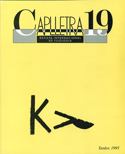El consonantisme final del mallorquí i el «llicenciament d'obertures»
DOI:
https://doi.org/10.7203/caplletra.19.7365Keywords:
fonologia, consonantisme final, mallorquí, «llicenciament d'obertures» Abstract
Abstract
We argue that Onsets can be licensed not only by Nuclei (the universal case), but also (parametrically) directly by prosodic domains such as Word or Phonological Phrase. The surfacing or deletion of Coda/Word-final consonants follows automatically if we allow that (1) a Coda contains no more than one consonant, (2) an Onset consists of a consonant or a nan-strident obstruent + a liquid, (3) an Onset is licensed by (a) a Nucleus or (b) the right edge of a Phonological phrase, (4) unlicensed elements are subject to Stray Erasure. Of these principles, (1), (2), (3a) and (4) are uncontroversial in GU; (4) corresponds to a parameter setting. This somewhat abstract syllabification allows a simple statement of the distribution of several phonological processes.
 Downloads
Downloads
Downloads
Published
How to Cite
-
Abstract554
-
PDF (Català)146
Issue
Section
License
Authors submitting work to Caplletra for publication must be the legitimate holder of the usage rights. Legitimacy for the purposes of publishing the work must also include images, tables, diagrams and any other materials that may complement the text, whether they are the author of such material or not.
Copyright: on publishing their work in the journal, the author grants Caplletra. Revista Internacional de Filologia usage rights (reproduction, distribution and public communication) for both the paper printed version and for the electronic version.
All work published in Caplletra is covered by the Creative Commons license type Attribution-NonCommercial-NoDerivatives 4.0 (CC BY-NC-ND 4.0).
RESPONSABILITY
Caplletra. Revista Internacional de Filologia does not necessarily identify with the points of view expressed in the papers it publishes.
Caplletra. Revista Internacional de Filologia accepts no responsibility whatsoever for any eventual infringement of intellectual property rights on the part of authors.






